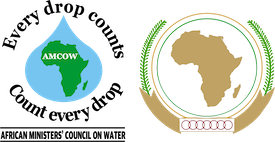African Ministers' Council on Water (AMCOW)
The African Ministers’ Council on Water (AMCOW) was formed in 2002 in Abuja Nigeria, primarily to promote cooperation, security, social, economic development and poverty eradication among member states through the effective management of the continent’s water resources and provision of water supply services. In 2008, at the 11th ordinary session of the African Union (AU) Assembly in Sharm el-Sheikh, Heads of State and Government of the AU agreed on commitments to accelerate the achievement of water and sanitation goals in Africa and mandated AMCOW to develop and follow up an implementation strategy for these commitments. AMCOW has also being accorded the status of a Specialised Committee for Water and Sanitation in the African Union.
Our Mission
Our Vision
Our History
In 1998, the UN agencies recommended that the United Nations Environment Programme (UNEP) should chair the Water Working Group of the United Nations System-wide Initiative on Africa (UNSIA). UNEP, working with other co-chairs, was requested to develop a strategy for consolidating progress in the work of the group. The agencies requested the working group (water cluster) of the UNSIA, under the leadership of the co-chairs (UNEP, World Bank and World Meteorological Organization) to take the necessary steps to “explore the feasibility of organizing a regional ministerial forum on water” in Africa.
It was recognized that the Ministers of Water in Africa, in view of the centrality of water resources in sustainable development, have a critical role to play. The objective of the section dealing with water and sanitation includes the need to:
(a) plan and manage water resources to become a basis for national and regional co-operation and development
(b) co-operate on shared rivers among member states
(c) ensure sustainable access to safe and adequate clean water supply and sanitation, especially for the poor.
In response to the task given to the UN agencies, UNEP and the UNSIA Secretariat, the World Bank, UNESCO and other agencies extended support to the informal consultations of selected ministers responsible for water, which took place in Nairobi, Kenya, on 11 October 2001. These consultations took place in the margins of the launch of the technical segment of the African Water Forum (AWF) at the same venue and convened with support of the World Bank in order to construct an effective mechanism for regional cooperation and development of water resources, it was clear that several elements would be critical. There would need to be consensus among governments on the structure to be put in place, and this would require the active participation of more ministers in the discussions. Thirdly, the process would require clear steps in order to eventually lead to the desired outcome. The first informal consultations by the region’s Ministers on forming a regional forum of water ministers in Africa took place in Nairobi leading to the beginning of an extensive dialogue that would ultimately lead to the founding of AMCOW, within the context of mounting global concern about Africa and the need for African countries to take the lead in addressing the continent’s numerous development problems.
At the margins of the Bonn International Conference on Freshwater (3-7 December 2001) ministers and representatives from 23 African countries held intensive consultations and decided to establish an African Ministerial Conference on Water (AMCOW) stating that “such a ministerial forum will enable our region to facilitate the development of common perspectives and positions on the agenda items of major international conferences”.
AMCOW was formally launched in Abuja in April 2002 with the Abuja Declaration. Thus the Abuja Declaration was the culmination of a long process to forge and formalize a coordination structure for water policy dialogue and policy in Africa. AMCOW like the African Ministerial Conference on Environment (AMCEN) which was formed earlier, represented an important milestone in the growing recognition that Africa must and will take the lead in bringing sustainable development to the continent.
AMCOW Founding Leaders
Watch this video of how AMCOW evolved over the years
During AMCOW’s celebratory session at the 9th edition of the World Water Forum, AMCOW honored its founding leaders through this highlight video and honorary awards.
Happy viewing!
Programmes and Initiatives
Africa Water Sector and Sanitation Monitoring and Reporting System (WASSMO) – WASSMO is a web-based system and tool designed for member countries in setting specific national, sub-regional and regional targets, for information generation and assessment, knowledge dissemination… Read More
AMCOW Pan-African Groundwater Program (APAGroP) – APAGroP was formally launched and operationalized through two AMCOW-led multi-stakeholder workshops – in Nairobi, Kenya (October 2019) and Kampala, Uganda (February 2020). It is the culmination of a d… Read More
African Sanitation Policy Guidelines (ASPG) – The ASPG Initiative aims to provide support and guidance to strengthen the enabling environment for sanitation in Africa… Read More
Africa Water and Sanitation Week (AWSW) – The Africa Water Week and AfricaSan are AMCOW’s flagship water and sanitation events and represent a political commitment at the highest level. They are institutionalized platforms to discuss and collectively seek solutions to Africa’s water and sanitation challenges… Read More
Message from the Executive Secretary
The role water management plays in ensuring human and environmental health; economic production; and climate resilience cannot be overemphasised. In this context, AMCOW’s mandate places the Secretariat at the forefront of initiatives to realise Aspiration 1 of the African Union Agenda 2063, which is: “a prosperous Africa based on inclusive growth and sustainable development”.


Our primary focus will be on leveraging political support; mobilising partnerships; and facilitating the application of knowledge and information to support.









